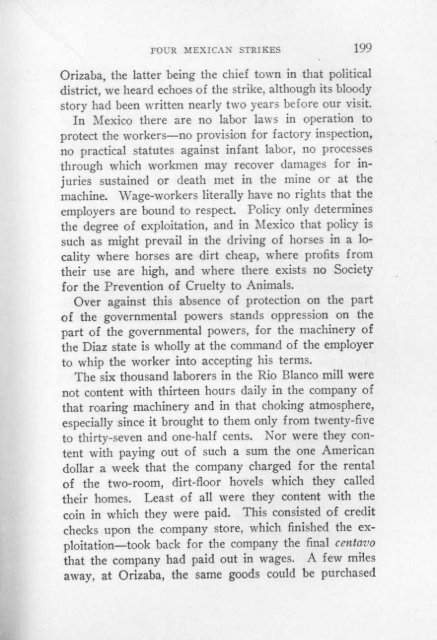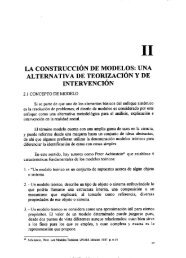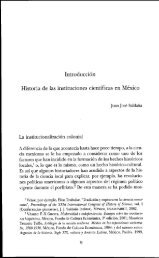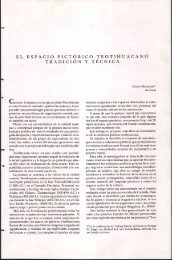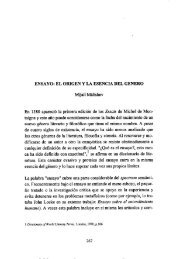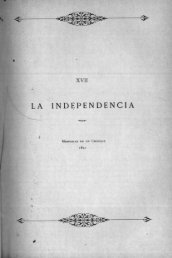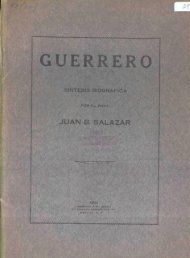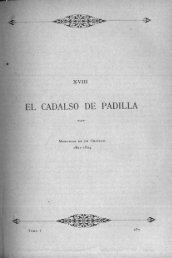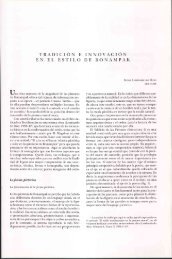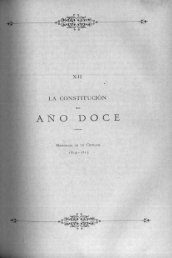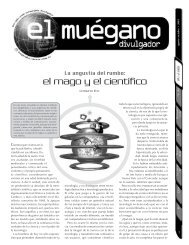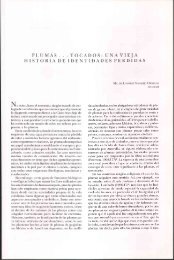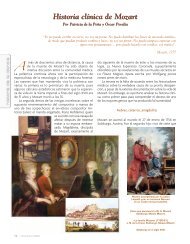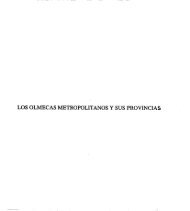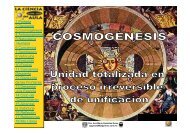- Page 1:
BarbarousMexico JOHN KENNETH TURNER
- Page 4:
In IfIII I U II- - ie U I'
- Page 8 and 9:
- I' -_r ' P - I I'll •b1 L- - Vi
- Page 10 and 11:
CLS F.R F[GH. - PRO C E D - I-OS -
- Page 13 and 14:
PREFACE TO THE THIRD EDITION. Sirrc
- Page 15 and 16:
CONTENTS. CHAPTER PAGE I. THE SLAVE
- Page 17 and 18:
BARBAROUS MEXICO CHAPTER I THE SLAV
- Page 19 and 20:
THE SLAVES OF YUCATAN 11 police had
- Page 21 and 22:
THE SLAVES OF YUCATAN 13 live, and
- Page 23 and 24:
THE SLAVES OF YUCATAN are a most cu
- Page 25 and 26:
THE SLAVES OF YUCATAN 17 of a plant
- Page 27 and 28:
THE SLAVES OF YUCATAN they are born
- Page 29:
SLAV!-: M(nIII-:K _NI) ('I!1LI) .I.
- Page 32 and 33:
22 BARBAROUS MEXICO by your constit
- Page 34 and 35:
24 BARBAROUS MEXICO months later he
- Page 36 and 37:
26 BARBAROUS MEXICO one-fourth of i
- Page 38 and 39:
It Ak I - • I I;_.: I I. I I - -.
- Page 40 and 41:
28 BARBAROUS MEXICO tions, for this
- Page 42 and 43:
30 BARBAROUS MEXICO days or weeks l
- Page 44 and 45:
32 BARBAROUS MEXICO large corn tort
- Page 46 and 47:
34 BARBAROUS MEXICO frozen over; Yu
- Page 48 and 49:
36 BARBAROUS MEXICO are dying in a
- Page 50 and 51:
38 BARBAROUS MEXICO assert that the
- Page 52 and 53:
40 BARBAROUS MEXICO were held at al
- Page 54 and 55:
42 BARBAROUS MEXICO and carried the
- Page 56 and 57:
44 BARBAROUS MEXICO that had been b
- Page 58 and 59:
46 BARBAROUS MEXICO with the fighte
- Page 60 and 61:
48 BARBAROUS MEXICO that the deport
- Page 62 and 63:
:: b• 'L I.. c RF I"A 404 -p kL A
- Page 64 and 65:
50 BARBAROUS MEXICO opportunity to
- Page 66 and 67:
52 BARBAROUS MEXICO soldiers came.
- Page 69 and 70:
OVER THE EXILE ROAD 53 let us ride?
- Page 71 and 72:
OVER THE EXILE ROAD At last we arri
- Page 73 and 74:
OVER THE EXILE ROAD 57 mouths showi
- Page 75 and 76:
OVER THE EXILE ROAD signal of the a
- Page 77 and 78:
OVER THE EXILE ROAD 61 the weight o
- Page 79 and 80:
OVER THE EXILE ROAD 63 Chinamen, fo
- Page 81 and 82:
OVER THE EXILE ROAD 65 peated the h
- Page 83 and 84:
CHAPTER IV THE CONTRACT SLAVES OF V
- Page 85 and 86:
THE CONTRACT SLAVES OF VALLE NACION
- Page 87 and 88:
I- - : \.. .( TYPE OF "KN;.LUH uLC
- Page 89 and 90:
THE CONTRACT SLAVES OF VALLE NACION
- Page 91 and 92:
THE CONTRACT SLAVES OF VALLE NACION
- Page 93 and 94:
THE CONTRACT SLAVES OF VALLE NACION
- Page 95 and 96:
THE CONTRACT SLAVES OF VALLE NACION
- Page 97 and 98:
THE CONTRACT SLAVES OF VALLE NACION
- Page 99 and 100:
THE CONTRACT SLAVES OF VALLE NACION
- Page 101 and 102:
IN THE VALLEY OF DEATH heads down.
- Page 103 and 104:
IN THE VALLEY OF DEATH 85 squad. At
- Page 105 and 106:
IN THE VALLEY OF DEATH 87 "They are
- Page 107 and 108:
IN THE VALLEY OF DEATH 89 shoes aga
- Page 109 and 110:
TN THE VALLEY OF DEATH feminine lin
- Page 111 and 112:
IN THE VALLEY OF DEATH 93 machetes
- Page 113 and 114:
IN THE VALLEY OF DEATH 95 "You will
- Page 116 and 117:
Li?I Vit. - Ll ti ^ r1m Al
- Page 118 and 119:
98 BARBAROUS MEXICO men and boys pl
- Page 120 and 121:
100 BARBAROUS MEXICO how fiercely t
- Page 122 and 123:
102 BARBAROUS MEXICO istration of "
- Page 124 and 125:
104 BARBAROUS MEXICO longer than a
- Page 126 and 127:
106 BARBAROUS MEXICO Tuztepec. I wa
- Page 128 and 129:
108 BARBAROUS MEXICO "Leave that to
- Page 130 and 131:
110 BARBAROUS MEXICO that without t
- Page 132 and 133:
" ii.. II.-.. - I • I -. - I -
- Page 134 and 135:
112 BARBAROUS MEXICO crowd sitting
- Page 136 and 137:
114 BAR1L\J(iUS MEXILU get away. So
- Page 138 and 139:
116 BARBAROUS MEXICO lated blocks w
- Page 140 and 141:
-. II -I - _'. It I I •1' - I - 4
- Page 142 and 143:
118 BARBAROUS MEXICO siml)le matter
- Page 144 and 145:
-, I - II- : . . M I L - I I j7 un
- Page 146 and 147:
CHAPTER VII THE DIAZ SYSTEM The sla
- Page 148 and 149:
122 BARBAROUS MEXICO determining fo
- Page 150 and 151:
124 BARBAROUS MEXICO the head of go
- Page 152 and 153:
126 BARBAROUS MEXICO silver, and in
- Page 154 and 155:
128 BARBAROUS MEXICO Pablo Escandon
- Page 156 and 157:
130 BRBAROUS MEXICO personality who
- Page 158 and 159:
132 BARBAROUS MEXICO trict, the mis
- Page 160 and 161:
134 BARBARUS MEX10J to help a farm
- Page 162 and 163:
136 BARBAROUS MEXICO division of Me
- Page 164 and 165:
CHAPTER VIII REPRESSIVE ELEMENTS OF
- Page 166 and 167:
140 BARBAROUS MEXICO country ever h
- Page 168 and 169:
y II. - I I... II I I I - I I - I I
- Page 170 and 171:
142 BARBAROUS MEXICO public powers
- Page 172 and 173:
144 BARBAROUS MEXICO placing of con
- Page 174 and 175:
it 4c 11 lr -- I • - I I - 1 A 1
- Page 176 and 177:
146 BARBAROUS MEXICO the officers a
- Page 178 and 179:
148 BARBAROUS MEXICO getter, since
- Page 180 and 181:
II - - ' 4 *f • INS IN mik MmLd.=
- Page 182 and 183: 150 BARBAROUS MEXICO The acordada i
- Page 184 and 185: 152 BARBAROUS MEXICO out that the v
- Page 186 and 187: 154 BARBAROUS MEXICO many weeks. Th
- Page 188 and 189: 156 BARBAROUS MEXICO prison, a pris
- Page 190 and 191: 18 BARBAROUS MEXICO If the We polit
- Page 192 and 193: CHAPTER IX THE CRUSHING OF OPPOSITI
- Page 194 and 195: 162 BARBAROUS MEXICO my position an
- Page 196 and 197: 164 BARBAROUS MEXICO it was crushed
- Page 198 and 199: I - - - - - I - I k £ I1'- 411 i__
- Page 200 and 201: 166 BARBAROUS MEXICO therefore once
- Page 202 and 203: 168 BARBAROUS ME..c1'Ji of men whom
- Page 204 and 205: 170 BARBAROUS MEXICO a lawyer and p
- Page 206 and 207: 172 BARBAROUS MEXICO on its way to
- Page 208 and 209: CHAPTER X THE EIGHTH UNANIMOUS ELEC
- Page 210 and 211: 176 BARBAROUS MEXICO The interview
- Page 212 and 213: 178 13ARfl.R()US MEN dent; Manuel C
- Page 214 and 215: 180 BARBAROUS MEXICO Some students
- Page 216 and 217: 182 BARBAROUS MEXICO ered from the
- Page 218 and 219: 184 BARBAROUS MEXICO ported that bo
- Page 220 and 221: 186 BARBAROUS MEXICO cratic papers
- Page 222 and 223: 188 BARBAROUS MEXICO This being the
- Page 224 and 225: 190 BARBAROUS MEXICO eral months. H
- Page 226 and 227: 192 BARBAROUS MEXICO ment of Reyes
- Page 228 and 229: 194 BARBAROUS MEXICO accorded the p
- Page 230 and 231: 196 BARBAROUS MEXICO being held inc
- Page 234 and 235: 200 BARBAROUS MEXICO for from twent
- Page 236 and 237: 202 BARBAROUS MEXICO and begged him
- Page 238 and 239: 204 13.\RIL\ROUS MEXICO ished in ot
- Page 240 and 241: 206 BARBAROUS MEXICO to censor the
- Page 242 and 243: 208 BARBAROUS MEXICO wages. The str
- Page 244 and 245: 210 BARBAROUS MEXICO "The oppressio
- Page 246 and 247: 212 BARBAROUS MEXICO When I visited
- Page 248 and 249: 214 BARBAROUS MEXICO at little or n
- Page 250 and 251: 9 1 BARBAROUS MEXICO in our War Dep
- Page 252 and 253: 218 BARBAROUS MEXICO Torres, who hu
- Page 254 and 255: CHAPTER XII CRITICS AND CORROBORATI
- Page 256 and 257: 222 BARBAROUS MEXICO The American '
- Page 258 and 259: 224 1RtLROts MEXICO Mr. C. V. Coope
- Page 260 and 261: 226 BARBAROUS MEXICO taken from con
- Page 262 and 263: 228 BARBAROUS MEXICO I believe that
- Page 264 and 265: 230 BARBAROUS MEXICO times severe.
- Page 266 and 267: 232 BARBAROUS MEXICO met sixteen-ye
- Page 268 and 269: 234 BARBAROUS MEXICO "At Calle Viol
- Page 270 and 271: 236 BARBAROUS MEXICO These criados
- Page 272 and 273: 238 BARBAROUS MEXICO reason for it?
- Page 274 and 275: 240 BARBAROUS MEXICO But let us not
- Page 276 and 277: 242 BARBAROUS MEXICO Just one more
- Page 278 and 279: 244 BARBAROUS MEXICO of the inciden
- Page 280 and 281: 246 BARBAROUS MEXICO them, so the a
- Page 282 and 283:
248 BARBAROUS MEXICO the first exte
- Page 284 and 285:
250 BARBAROUS MEXICO or in his busi
- Page 286 and 287:
252 BARBAROUS MEXICO As to the Suns
- Page 288 and 289:
254 BARBAROUS MEXICO the United Sta
- Page 291 and 292:
THE AMERICAN PARTNERS OF DIAZ 25 5
- Page 293 and 294:
THE AMERICAN PARTNERS OF DIAZ 257 M
- Page 295 and 296:
THE AMERICAN PARTNERS OF DIAZ 259 c
- Page 297 and 298:
THE AMERICAN PARTNERS OF DIAZ 261 L
- Page 299 and 300:
THE AMERICAN PARTNERS OF DIAZ 263 t
- Page 301 and 302:
THE AMERICAN PARTNERS OF DIAZ 265 w
- Page 303 and 304:
THE AMERICAN PARTNERS OF DIAZ 267 a
- Page 305 and 306:
THE AMERICAN PARTNERS OF DIAZ 259 w
- Page 307 and 308:
AMERICAN PERSECUTION OF ENEMIES OF
- Page 309 and 310:
'Jt)MAS SAI1AI{IA ENIIQ1E FTA)I1ES
- Page 311 and 312:
AMERICAN PERSECUTION OF ENEMIES OF
- Page 313 and 314:
AMERICAN PERSECUTION OF ENEMIES OF
- Page 315 and 316:
AMERICAN PERSECUTION OF ENEMIES OF
- Page 317 and 318:
AMERICAN PERSECUTION OF ENEMIES OF
- Page 319 and 320:
AMERICAN PERSECUTION OF ENEMIES OF
- Page 321 and 322:
AMERICAN PERSECUTION OF ENEMIES OF
- Page 323 and 324:
AMERICAN PERSECUTION OF ENEMIES OF
- Page 325 and 326:
AMERICAN PERSECUTION OF ENEMIES OF
- Page 327 and 328:
AMERICAN PERSECUTION OF ENEMIES OF
- Page 329 and 330:
AMERICAN PERSECUTION OF ENEMIES OF
- Page 331 and 332:
AMERICAN PERSECUTION OF ENEMIES OF
- Page 333 and 334:
AMERiCAN PERSECUTION OF ENEMIES OF
- Page 335 and 336:
AMERICAN PERSECUTION OF E:EM1Ls uI
- Page 337 and 338:
CHAPTER XVI DIAZ HIMSELF "But Diaz
- Page 339 and 340:
DIAZ HIMSELF 301 but when they, his
- Page 341 and 342:
DM2 HIMSELF 303 quarter of a centur
- Page 343 and 344:
DIAZ HIMSELF 305 soldier and almost
- Page 345 and 346:
DIAZ HIMSELF 307 an amendment to th
- Page 347 and 348:
DIAZ HIMSELF 309 far discovered in
- Page 349 and 350:
DIAZ HIMSELF 311 ported. Within a c
- Page 351 and 352:
DL\Z HIMSELF 313 revenge visited up
- Page 353 and 354:
I)1.\Z 1[!MSL[.1 33 —that 1e was
- Page 355 and 356:
DIAZ HIMSELF 317 gets. Church marri
- Page 357 and 358:
DIAZ HIMSELF 319 Both vanit y and l
- Page 359 and 360:
DIAZ HIMSELF 321 to give me their h
- Page 361 and 362:
DIAZ HIMSELF 323 sion by foreigners
- Page 363 and 364:
THE MEXICAN PEOPLE 323 tribute4 to
- Page 365 and 366:
THE MEXICAN PEOPLE 327 wage-worker
- Page 367 and 368:
4 L1 1. -mw 0 I I. 1. - I. / I
- Page 369 and 370:
THE MEXICAN PEOPLE 329 in the many
- Page 371 and 372:
THE MEXICAN PEOPLE 331 istence by s
- Page 373 and 374:
THE MEXICAN PEOPLE 333 enabling him
- Page 375 and 376:
' I - -•_4 :-. -. •. - I- • ,
- Page 377 and 378:
THE MEXICAN PEOPLE 335 capable in t
- Page 379 and 380:
THE MEXICAN PEOPLE 337 aild each ne
- Page 381 and 382:
THE MEXICAN PEOPLE 339 \Iexico is a
- Page 383 and 384:
- 1••
- Page 385 and 386:
- FSR 1910 AU TO R TUMM TITULO Barb


